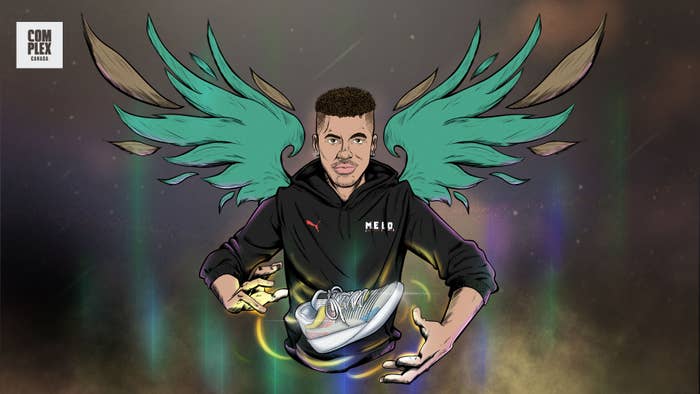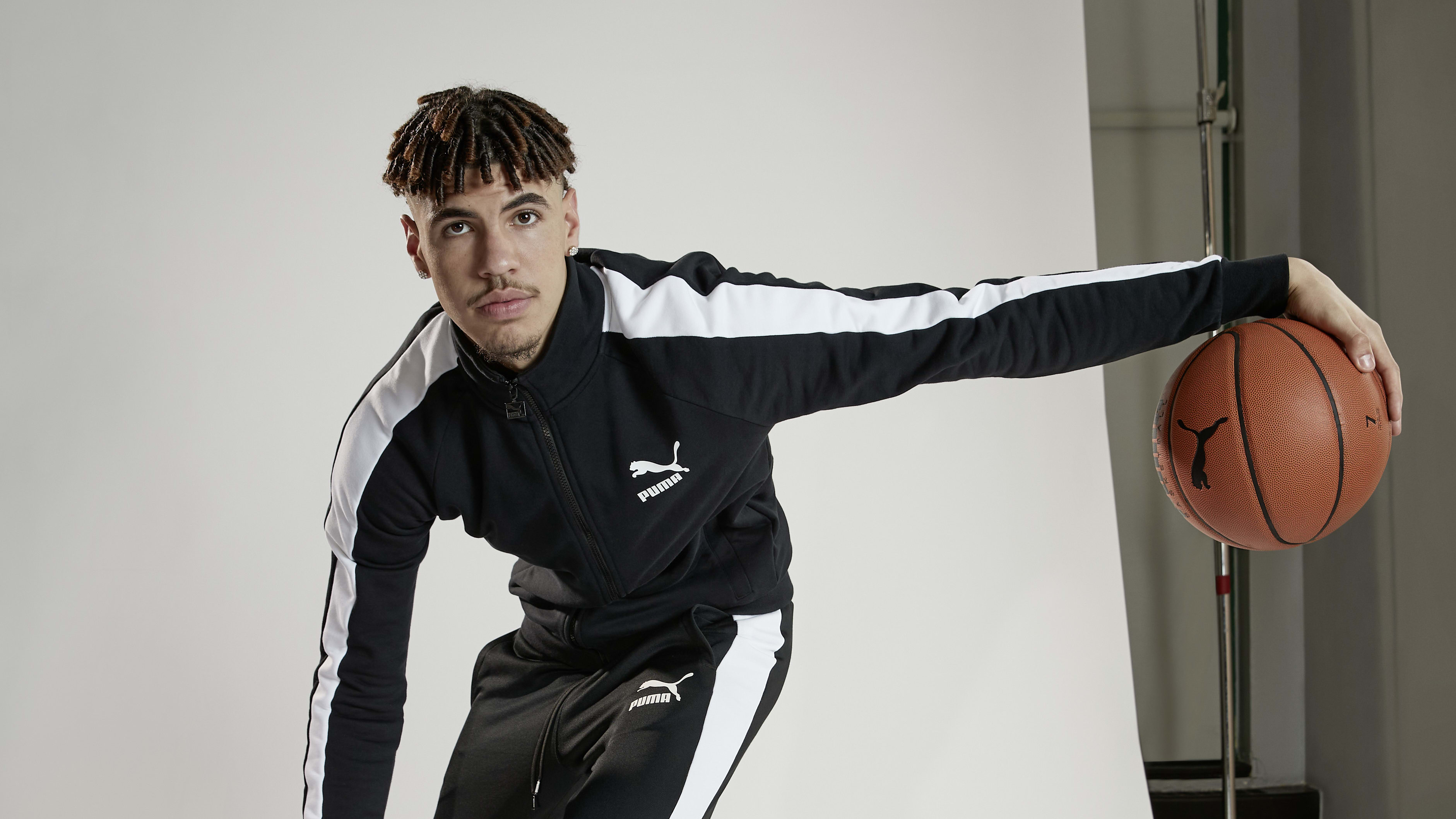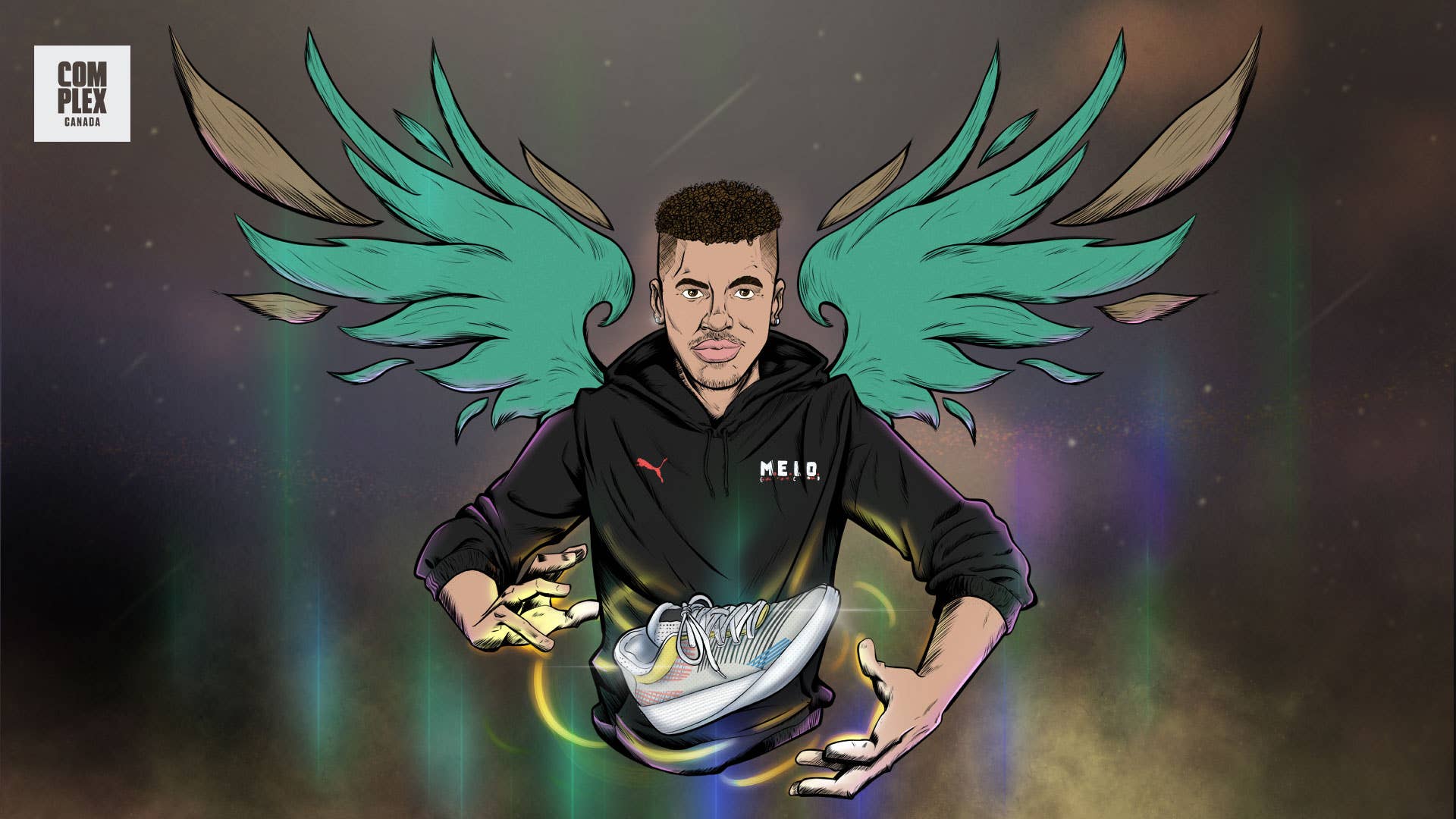
LaMelo Ball is about to enter the NBA, in one of its most unusual seasons ever, as one of its most unusual rookies ever.
For starters, he’s got a weird jump shot. It’s a two-handed thrust that looks almost like he’s tossing a chest pass at the basket (until it goes in).
And then there’s the other stuff: his dad is LaVar Ball, he grew up starring in a reality TV show, he had his own signature shoe at the age of 16, and he’s taken a very strange route to the NBA. LaMelo was famously pulled out of high school by LaVar in his sophomore year and flown to Lithuania, where he competed professionally against grown men. He returned stateside to play for the Junior Basketball Association, owned by his pops, before doing a stint in Australia’s National Basketball League. After landing with the Charlotte Hornets as the third overall pick in November’s NBA draft, the 19-year-old became the highest-selected U.S.-born draftee to bypass college ball.
As player origin stories go, LaMelo’s is as atypical they come—and it’s exactly why PUMA wanted him to be the newest face of its basketball program. Hell, the messaging is literally written on the first shirt and hoodie the German brand released for the 6-foot-7 point guard: “Not from Here” and “01 of 01.” It’s been a couple years since PUMA returned to the hoops sneaker space after a 20-year absence. Well aware that Nike and Adidas have dominated the marketplace for decades, the brand’s understood that the only way to compete with the traditional shoe powers is by doing things differently.
"PUMA's been making waves since their comeback to basketball, not just on the court but for the culture," LaMelo told Complex after his signing with the brand this fall, becoming the first Ball brother to ink an endorsement deal outside of Big Baller Brand. "They're doing big things and are the new wave of hoops."
It’s not lost on PUMA that Ball, who currently has more Instagram followers than the majority of NBA players, is as divisive as he is popular. In fact, that’s sort of the appeal, and may also be part of what’s attracted a new crop of players to the brand: it isn’t afraid to rock the boat.
PUMA re-entered performance basketball with a bang during the 2018 draft, shocking the sneaker world by signing five of the top 16 picks: David Ayton (No.1 overall), Marvin Bagley III (No. 2 overall), Kevin Knox (No. 9), Michael Porter Jr. (No. 14), and Zhaire Smith (No. 16). With Ball, the brand picked up the most recognizable, and unconventional, name in this year’s draft.
“PUMA Basketball is still a relatively new space for us as far as our business goes,” says Curtis Begg, Senior Director of Marketing at PUMA Canada. “We've got a strong history of soccer in Europe, so for us to get into a North American team sport was critical. This is the kickoff to our third season in basketball, if you can believe it. And Lamelo has been a great addition; he's young and energetic and definitely marches to his own beat.”
“Internally, we talk about the ‘game changer’—that's a pretty targeted consumer we're looking at."
The brand’s history in basketball runs deep, starting back in 1973, when New York Knicks star Walt “Clyde” Frazier became the first player in NBA history to get his own signature shoe, the PUMA Clyde. In the ’80s, the brand courted players like Isaiah Thomas, Alex English, and Ralph Sampson. But things cooled off after PUMA’s infamously short-lived deal with the Toronto Raptors’ Vince Carter in 1998. The company would spend the next two decades on the sidelines of the category.

So what made PUMA decide to dive back into the game? It doesn’t take a brainer to figure that out: of all the big major-league sports in North America—basketball, football, baseball, hockey—it’s the NBA that’s leading the charge in influencing fashion and pop culture. You won’t catch Sidney Crosby rocking a skirt suit to Paris Fashion Week—leave that to the basketball players. “The time was right for us to come back, and I think a lot of it has to do with the opportunity off the court just as much as it does on the court,” says Begg. “We're interested in the tunnel walk and making sure there's high visibility in moments like that, too. It’s about the culture of basketball.” But the real question is: How can the brand contend with the kick titans that have commanded the space for so long?
PUMA’s attack plan is to offer kids an alternative to the establishment. Targeting younger consumers in the 14-to-18-year-old range, according to Begg, the brand is positioning itself as a subversion of the sneaker status quo—a cooler, out-of-the-box option. Its first order of business was hiring the coolest guy out there, Jay-Z, as its creative director for basketball. Besides furthering PUMA’s presence in hip-hop—this summer they gave J. Cole his own signature shoe, the RS-Dreamer, which was worn by Ball in his first photoshoot with the brand—Hov also pushed the idea to launch the Clyde Court “Disrupt,” its first hoops sneaker in decades, in attention-grabbing orange and yellow.
"We've even gone as far as taking tweets and comments of fans hating PUMA Basketball, printing them out, putting them on a cake, and eating it on social media.”
“Disrupt” also happens to be a good way to describe PUMA’s current M.O. “Internally, we talk about the ‘game changer’—that's a pretty targeted consumer we're looking at,” says Begg. “And it's not just a game changer, but also someone who's inspired by the game changer. That comes back to LaMelo—we feel that he's a game changer. The consumer we're looking at is inspired by someone like that, who's willing to shake things up, be a little bit different, and show confidence in everything he does."
We see that confidence on display in PUMA’s cavalier approach to marketing; it’s exercised a level of creative limberness that larger brands don’t always have. The first campaign videos for Ball show him performing a series of doctored, over-the-top highlights, from flinging a behind-the-back pass to himself to palming six basketballs with six arms extended Virtruvian style. PUMA has also had no qualms about getting its hands dirty in the NBA Twitter cycle. The ads for the new PUMA Clyde All-Pro Kuzma Mid feature a number of negative tweets from Kyle Kuzma’s detractors, with the Los Angeles Laker concluding the spot by thanking them for the motivation. (Begg couldn't confirm whether a signature shoe for Ball was in the works.)
It’s not the first time PUMA has addressed naysayers head-on. “We've even gone as far as taking tweets and comments of fans hating PUMA Basketball, printing them out, putting them on a cake, and eating it on social media,” says Begg. “Just to have fun with it.” A flex if we’ve ever heard of one.
So, PUMA’s been shooting its provocative shots with the basketball market, and thus far, it’s been draining them. Over the last couple years, the brand has grown at a faster rate than its competitors, and its stock has delivered superior returns, according to Forbes. The response has been a good one.
LaMelo will make his debut for the Hornets—who are owned, ironically, by Michael Jordan, the namesake of one of PUMA’s rival brands—on December 12, when they face the Raptors in a preseason game. The team has no clear leaders, meaning Ball will be given the keys to the franchise. He’ll have a chance to become the first player on PUMA’s current hoops roster to take the leap to stardom. Of course, some will be praying for his downfall, based alone on the fact that his dad cockily guaranteed he will be named Rookie of the Year. But PUMA likely won’t be too concerned with the hate. Chances are, they’ll write a cheeky tweet about it.
“It's about having fun, having a laugh, and not taking it too seriously, just because it's tough out there,” says Begg. “Not everyone loves us and not everyone loves every shoe we put out. But that's OK. We know that we're not for everyone. We do our thing and we feel good about it.”

